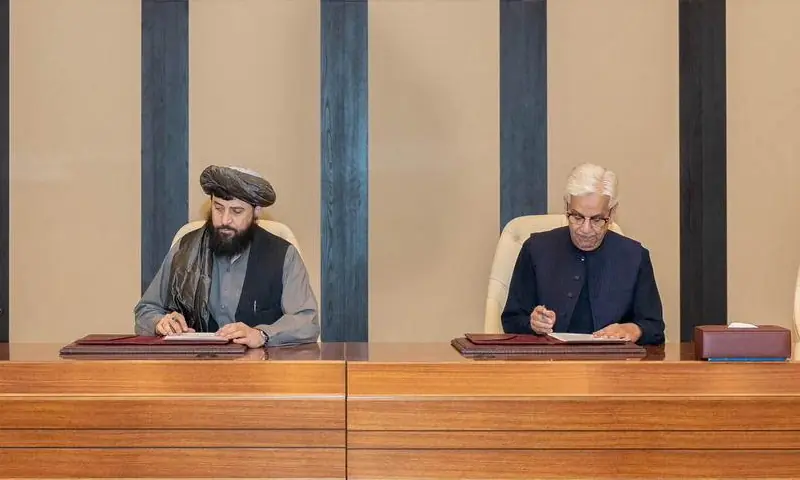Pakistan and Taliban Engage in Critical Talks in Istanbul: A Deep Dive into the Agenda and Regional Implications

Pakistan and Taliban Engage in Critical High-Stakes Talks in Istanbul to Forge Path to Peace
ISTANBUL, TURKIYE – October 25, 2025 – In a move being closely watched by global capitals from Washington to Beijing, Pakistani officials and representatives of the banned Tehreek-e-Taliban Pakistan (TTP) are locked in a crucial second round of negotiations in the historic city of Istanbul today. This high-wire diplomatic endeavor, facilitated by a coalition of international stakeholders, aims to broker a fragile peace and end a decades-long insurgency that has bloodied Pakistan’s tribal regions and threatened its national security.
The atmosphere is tense, the stakes are monumental. This Istanbul process represents what many analysts are calling a “last best chance” to find a political solution to a conflict that military operations alone have failed to decisively end.
The Istanbul Dialogue: What’s on the Table?
While official details are shrouded in necessary secrecy, sources privy to the closed-door discussions have revealed a complex and multi-layered agenda to Paknovate. The talks are building upon the preliminary, and often contentious, discussions held in previous meetings.
The core demands from the TTP side, as understood from regional security analysts, include:
- The Reversal of Tribal Areas Merger: A primary and highly controversial TTP demand is the reversal of the constitutional 25th Amendment, which merged the former Federally Administered Tribal Areas (FATA) into Khyber Pakhtunkhwa. The group seeks a return to a pre-2018 administrative status, a point of significant resistance from the Pakistani state.
- Release of Prisoners: The TTP is pushing for the release of a significant number of its militants and commanders currently held in Pakistani prisons.
- Withdrawal of Security Forces: They demand a phased withdrawal of the Pakistan Army from the tribal districts, allowing their own influence to fill the vacuum.
- Implementation of Sharia Law: The establishment of a rigid interpretation of Sharia law in the region remains a foundational ideological goal.
Conversely, the Pakistani delegation, led by senior security officials and diplomats, has laid down non-negotiable conditions:
- Absolute and Irrevocable Ceasefire: A complete end to terrorist attacks, targeted killings, and extortion activities across Pakistan, particularly in KP and Balochistan.
- Laying Down of Arms: The complete disarmament and dissolution of TTP’s military wing.
- Acceptance of the Constitution: The TTP must pledge allegiance to the Constitution of Pakistan, accepting the state’s sovereignty and legal framework.
A senior analyst based in Islamabad, who wished to remain anonymous due to the sensitivity of the topic, told Paknovate, “The gap between the two sides is a chasm. The TTP’s demands are essentially a call for a state within a state. For Pakistan, accepting these would set a dangerous precedent and unravel the hard-fought gains of numerous military operations. The art of this negotiation will be finding face-saving middle ground that doesn’t compromise the state’s fundamental authority.”
The Shadow of History: Why These Talks Are Different
This is not the first attempt at dialogue. Past efforts, notably in 2014, collapsed spectacularly, leading to the devastating Army Public School attack in Peshawar and a full-scale military offensive. So, what has changed?
1. The Geopolitical Pivot: The return of the Afghan Taliban to power in Kabul in 2021 fundamentally altered the landscape. The TTP now enjoys a perceived safe haven across the border, making a purely military solution for Pakistan more difficult and complex. The Afghan Taliban, while ideologically aligned with the TTP, are also under pressure to manage their relationship with Islamabad, creating a unique dynamic for facilitation.
2. Domestic Economic and Security Pressures: Pakistan is grappling with a severe economic crisis. The constant drain of resources to maintain security operations in the western border regions is unsustainable. The government of Prime Minister [Current PM’s Name] is under immense pressure to stabilize the country, attract foreign investment, and create a secure environment for development projects linked to the China-Pakistan Economic Corridor (CPEC).
3. International Impetus: The United States and its allies, despite their complicated history with the Taliban, view a stable Pakistan as crucial for regional stability, especially concerning the threat of ISIS-Khorasan (ISIS-K). There is a quiet but firm international backing for a negotiated settlement that contains the spread of global jihadist networks.
The Human Cost: The Stories Behind the Headlines
Beyond the political statements and strategic analysis lies the immense human suffering of the people of Khyber Pakhtunkhwa and the tribal districts. For over two decades, families have been caught in the crossfire—displaced from their homes, losing loved ones, and seeing their livelihoods destroyed.
The stories from the ground are heart-wrenching. A school teacher from North Waziristan, who we will call Farid, shared his anguish with Paknovate: “We are tired of war. Our children have grown up knowing only checkposts, curfews, and fear. We want peace, but not a peace that surrenders our land to the militants. We want the peace of the constitution, the peace of schools and hospitals, not the peace of the gun.”
This sentiment echoes throughout the region. The local population yearns for normalcy but is deeply skeptical of both the TTP’s intentions and the state’s ability to deliver a lasting peace. The success of these talks isn’t just a political victory; it’s a matter of survival for millions.
Regional Repercussions: A Delicate Balancing Act
The outcome of the Istanbul talks will send shockwaves far beyond Pakistan’s borders.
- Afghanistan: The Afghan Taliban walk a tightrope. While they sympathize with their Pakistani ideological brethren, they also rely on Pakistan for diplomatic engagement and economic lifelines. A successful negotiation would ease pressure on the Kabul regime, while a failure could lead to increased cross-border tensions and even military skirmishes.
- China: Beijing’s primary concern is the security of its citizens and CPEC projects. Any deal that fails to fully neutralize the TTP threat will be viewed as a major failure by China, potentially cooling its strategic partnership with Pakistan.
- India and Iran: New Delhi will be watching warily, concerned about any process that could legitimize a terrorist group and potentially free up Pakistani military resources for its eastern border. Iran, meanwhile, is concerned about the spillover effect and the potential for a resurgent TTP to inspire separatist elements in its own Baloch-majority Sistan province.
Expert Opinions: A Spectrum of Views
We reached out to a range of experts to get a nuanced perspective on the talks.
Dr. Ayesha Siddiqa, a renowned security analyst, offered a cautious outlook: “The Istanbul process is a necessary gamble. The military has realized the limits of its kinetic power in the face of a changed geopolitical reality. However, the state must not negotiate from a position of weakness. Any agreement must be verifiable and must not come at the cost of the fundamental rights of the local Pashtun population.”
Conversely, a former ambassador with extensive experience in the region told Paknovate, “This is a moment of strategic necessity. The alternative to talks is a protracted, low-intensity war that bleeds the nation. Even an imperfect peace is better than a perfect war. The key will be robust international monitoring and guarantees to ensure compliance.”
The Road Ahead: Scenarios and Possibilities
As the delegates deliberate in Istanbul, several potential outcomes loom:
- The Breakthrough Deal: The most optimistic scenario involves a phased ceasefire, a gradual demobilization of TTP fighters in exchange for a limited amnesty and their peaceful integration into society, with a special administrative status for the region that falls short of reversing the FATA merger.
- A Fragile Truce: A more likely outcome is a temporary, renewable ceasefire that reduces violence in the short term but kicks the can of a permanent political settlement down the road. This would be a tactical victory but a strategic uncertainty.
- Complete Collapse: The talks could fail entirely if either side proves too intransigent. This would likely trigger a new and intense wave of violence, with the Pakistani military launching fresh operations and the TTP escalating its urban terror campaign.
Conclusion: A Nation Holds Its Breath
The talks in Istanbul are more than just a diplomatic meeting; they are a pivotal moment in Pakistan’s history. The decisions made in those closed rooms will shape the nation’s security, its economic future, and the very fabric of its society. The path to peace is fraught with peril, littered with the ghosts of past failures and the weight of immense expectations.
For the people of Pakistan, the hope is that their leaders can navigate this labyrinth with wisdom and foresight, delivering a peace that is just, lasting, and upholds the sovereignty of the state. The world watches and waits.
While the government seeks political solutions to security challenges, it continues to roll out impactful social welfare initiatives. Don’t forget to check out our other exclusive reports on key programs affecting millions of Pakistanis:
- Ehsaas Program: Latest Update on Registration and New Payment
- CM Punjab Free Laptops Scheme: Distribution Date and Eligibility Criteria Revealed
- Mariam Nawaz Hunahar Scholarship: Apply Online for Financial Aid 2025
- PM Laptop Scheme 2025
Stay with Paknovate for the latest breaking news and in-depth analysis on the issues that matter most to you.

